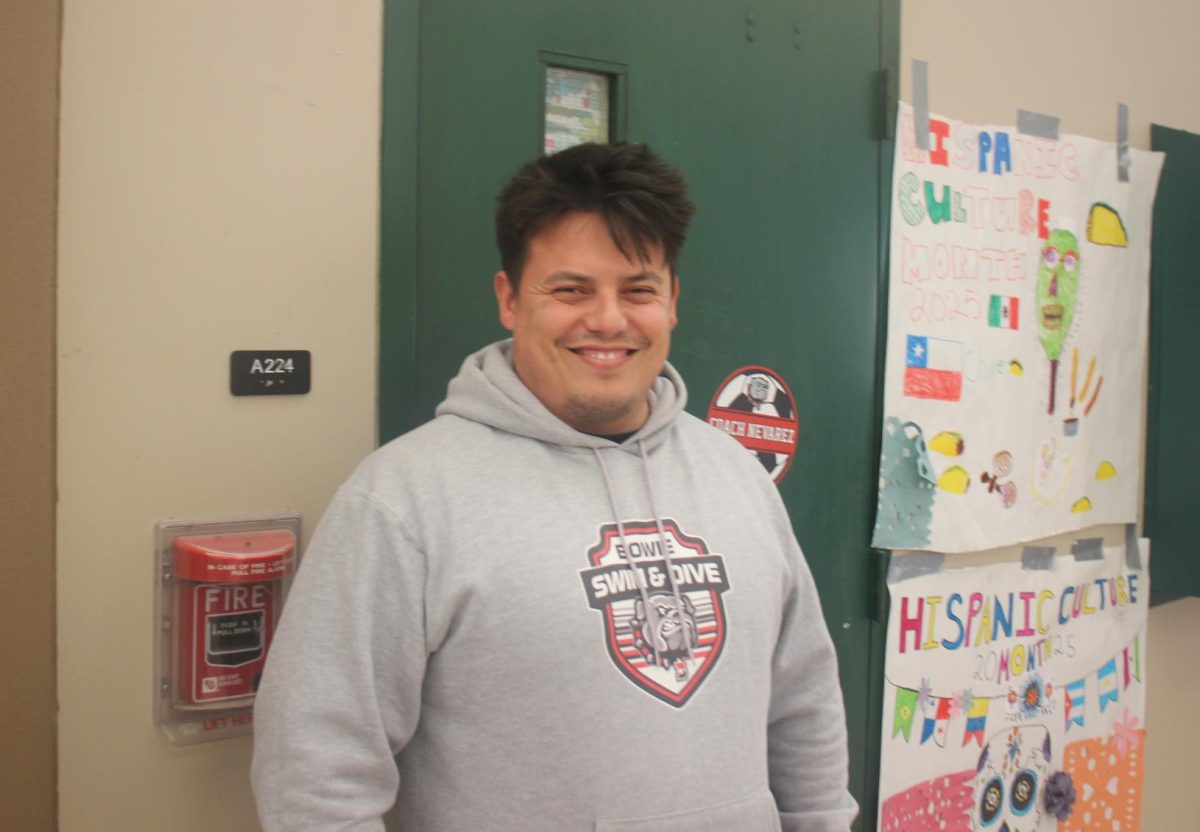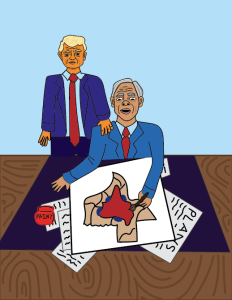New immigration laws spark debate
Since his first day on the job, President Joe Biden has been trying to make changes to America’s immigration policies. January 21, 2021 (having assumed office January 20), he proposed a bill that would replace the word “alien” with “non-citizen.” January 23, he proposed an immigration bill that would make countless changes to current immigration policy.
June 2, 2022
Biden Administration makes changes to American migration policy
Alien.
Reading this word, graphics design teacher Jeni Huereca laughs. In United States immigration law, immigrants are referred to as “aliens.” Although she recognizes how negative that term might be, it resonates with her, as her experiences immigrating from Great Britain to Austin were defined by abnormality; she felt like an alien.
Since his first day on the job, President Joe Biden has been trying to make changes to America’s immigration policies. January 21, 2021 (having assumed office January 20), he proposed a bill that would replace the word “alien” with “non-citizen.” January 23, he proposed an immigration bill that would make countless changes to current immigration policy.
“[To current immigrants,] good luck,” Huereca said. “It’s a long and expensive process, but if you’re able to do it, it’s worth it. Here at Bowie, I’ve found that it’s definitely worth it. Austin’s a diverse and cosmopolitan city; I’m certain that there’s families that are going through the same process that I did, and any kind of assistance is awesome, because it’s a big deal coming from somewhere with absolutely nothing.”
Huereca believes the current processes are long-winded, cumbersome, and expensive. She would like to see it more streamlined; as people can’t work during their immigration process, they need to rely on someone else, making expenses even heavier. Overall, she thinks it should be three things: quicker, cheaper, and simpler.
“Some people come here to escape violence, and they come here with little money,” Huereca said. “It’s a big thing to pay so much money for a difficult process, so I see why people would come here illegally, because there’s no option to do so legally. People face danger, injury, and even death getting here, because it’s too expensive and too difficult to come in other ways. It needs to be safer and fairer.”
Special education teacher Polina Pomytkina was born in Russia and came to the U.S. when she was three. Her parents moved here on a work visa, and they spent roughly 15 years going through the process to gain citizenship.
“I’m the child of immigrants, so my parents bore the brunt of the process– but had I not been an immigrant, I don’t know if I would have the opinions and perspective that I do,” Pomytkina said. “My history definitely makes me a more passionate advocate for immigrants’ rights. I think people should be allowed to live where they want to live, but that opinion isn’t very popular.”
Counselor April Giuffre is the daughter of two Filipino immigrants, and she’s been surrounded by other immigrant families her whole life. She believes this has given her a good understanding of immigrants’ experiences, and therefore doesn’t agree with some of the current policies surrounding migration.
“If this is the country you want to be in, don’t give up,” Giuffre said. “Believe in the American dream, as cheesy as that sounds, it truly worked for my family. We got more opportunities here for education and jobs than we would’ve back home, so I say don’t give up.”
Having taken presidency after Donald Trump, whose campaigns promoted the restriction of immigration into America, Biden is making strides to undo many Trump-era policies. One of these is Title 42; this code gives health authorities the right to prevent US immigration if doing so might prevent the spread of diseases.
“It’s more hurtful than it is helpful,” Pomytkina said. “A lot of these policies are very subjective for who gets to determine who’s healthy enough to enter, and who isn’t. That person’s internal biases will probably affect who gets to migrate and who doesn’t.”
Implemented in March of 2020, Title 42 was based on a public health law made in 1944; it’s set to expire May 23. Although she can see the logic behind preventing the spread of diseases at the border, Giuffre thinks the policy is “strange” and subjective.
“Everybody’s going to be in a different state of health at any moment,” Giuffre said. “I don’t know what Trump meant with regards to ‘health,’ do you have to be in perfect health to travel? Do you have to be in perfect health to go to school or work? I, personally, don’t think so.”
Biden also wants to introduce a new immigration bill that would allow 11 million undocumented immigrants to get full US citizenship. Among other things, the new bill focuses on keeping families together by raising the limit of visas issued and redistributing unused visas. Immigrants will also be able to temporarily live with family in the States while waiting for green cards.
“Keeping families together is important,” Pomytkina said. “I certainly think that if I had been separated from my parents when we came to the U.S., I would not be in the place that I am today. There’s always more that can be done, and Biden’s immigration policies are not perfect, but that’s definitely a step in the right direction.”
The bill also promotes integration into American society and culture; more funding will go to organizations that promote inclusion and English-language instruction.
“I have the advantage of speaking English as my first language, but even some of the cultural stuff was a big change for me,” Huereca said. “So if you’re dealing with not speaking English, on top of everything else, I think any support would be wonderful. It also allows people to become part of the community and do positive things.”
Biden also plans to address the causes of migration: $4 billion will go to helping El Salvador, Guatemala, and Honduras fight violence, corruption and poverty in their states, aiming to reduce factors pushing citizens to leave.
“I think it’s an interesting strategy,” Pomytkina said. “The effectiveness is questionable. At the end of the day I feel it won’t necessarily help the people who are coming to the US and seeking citizenship here.”
Governor Greg Abbott, in what Huereca believes was a move of “showboating,” has responded to Biden’s new policies by busing immigrants to the capital at Washington, D.C. At a press conference in early April, he promised that migrant volunteers would be sent to the doorstep of federal lawmakers, where he said the Biden administration “will be able to more immediately address the needs of the people they are allowing to come across our border.”
“Like most things Greg Abbott does, it’s a PR move, meant to get people to vote for him,” Pomytkina said. “He clearly stated he doesn’t want to deal with the issue, so he’s just pushing it off onto other people.”
Abbott said his goals were to draw attention to the “failed immigrant policies” of President Biden, but others believe he’s doing so to get on the president’s nerves, hoping for chaos. Instead, migrants are giving him thanks for the free ride. Volunteers have been meeting the migrants and taken them to their assigned immigrant courts.
“I don’t feel like singling out individuals just because they weren’t born here makes any kind of sense,” Giuffre said. “There are actual criminals that are American citizens, but instead Abbott is focusing on people who have done nothing.”
Despite all of the recent debates surrounding immigration, Huereca is proud of her history. Being British, she gets lots of questions about her accent and where she’s from, and she’s happy to know that it makes her memorable.
“I feel that my accent is a novelty,” Huereca said. “I like being British in America and having a very noticeable accent, because it opens me up to meeting and talking to more people. I also like having the perspective, in education, of having gone to school in the UK and taught here, and seeing a difference. It broadened my experience for sure.”
Although she hopes the process might be improving, Pomytkina still believes the system isn’t perfect. According to her, the current methods produce more trouble and insecurity than they should. Giuffre wishes the government could empathize with immigrants, and Pomytkina wishes immigrants could be guaranteed an easy process to legitimate citizenship.
“After Trump became president, it became clear that there’s a difference between being a born citizen and a naturalized citizen; our citizenship isn’t guaranteed the same way that born citizenship is,” Pomytkina said. “There’s a lot of insecurity, even when you work for years and years for citizenship. You still know, deep down, that you’re not secure in the place you’ve made a home, and that’s scary. They [politicians] should make sure that migrants know they can comfortably call the U.S. a home for however long they want, not for however long some federal employee wants.”









